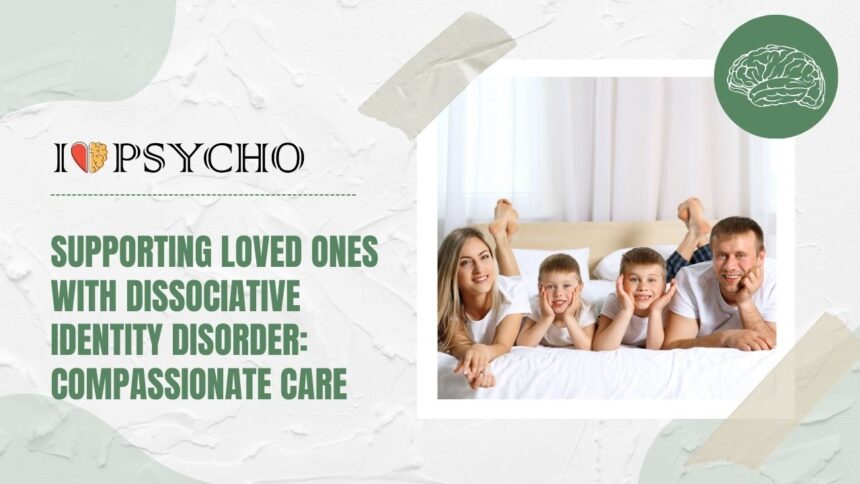Welcome to a journey of understanding and support for those navigating life with Dissociative Identity Disorder (DID). As we delve into the intricate world of DID, we unravel the layers of compassion needed to nurture our loved ones through their unique experiences. Let’s explore how empathy, patience, and knowledge can make a profound difference in the lives of those with DID.
What is Dissociative Identity Disorder (DID)?
Dissociative Identity Disorder (DID) is a complex mental health condition characterized by the presence of two or more distinct identities or personality states within an individual. These alternate identities, often referred to as “alters,” may have their own unique traits, memories, and behaviors. DID typically develops as a coping mechanism in response to severe trauma or abuse during childhood. The fragmentation of identity allows individuals to compartmentalize distressing experiences, helping them survive overwhelming situations.
People with DID may experience gaps in memory, loss of time, and significant distress due to the coexistence of different identities. Each alter can vary in age, gender, and temperament, contributing to the intricate nature of this disorder. Treatment for DID often involves therapy aimed at integrating these separate identities into a cohesive sense of self while addressing underlying trauma. Understanding the complexities of DID is crucial in providing effective support and care for those affected by this condition.
Understanding the Symptoms and Causes
Dissociative Identity Disorder (DID) is a complex mental health condition characterized by the presence of two or more distinct identities or personality states within an individual. These alternate identities may have their own unique names, characteristics, and mannerisms. People with DID may experience memory gaps, amnesia, and difficulty recalling important personal information.
The exact causes of DID are not fully understood but are believed to be rooted in a combination of environmental, psychological, and biological factors. Trauma during early childhood, such as physical or sexual abuse, is often linked to the development of DID. The mind’s way of coping with overwhelming experiences can lead to the fragmentation of one’s identity into separate parts.
Symptoms of DID can vary widely from person to person and may include experiencing severe headaches, depression, anxiety, mood swings, and disturbances in relationships. It is essential for loved ones to educate themselves about these symptoms and approach them with empathy and understanding.
By gaining insight into the symptoms and potential causes of Dissociative Identity Disorder, individuals can better support their loved ones on their journey towards healing and recovery.
The Importance of Compassionate Care for Loved Ones with DID
Compassionate care is crucial for individuals with Dissociative Identity Disorder (DID) as it helps create a safe and supportive environment where they can feel understood and accepted. People with DID often face stigma, misconceptions, and challenges in their daily lives. Therefore, offering compassionate care involves being patient, empathetic, and non-judgmental towards their experiences.
By showing understanding and compassion towards loved ones with DID, caregivers can help them feel validated and supported in their journey towards healing. It is essential to educate oneself about DID to better comprehend the unique needs of those living with this complex disorder.
Taking the time to listen attentively without interruption or judgment can make a significant difference in how individuals with DID perceive themselves and their struggles. Offering emotional support, validation, and encouragement can help build trust and strengthen relationships between caregivers and loved ones with DID.
Incorporating mindfulness techniques such as deep breathing exercises or grounding exercises during moments of distress can also be beneficial for individuals with DID. Practicing compassionate care enables caregivers to provide the necessary support for their loved ones as they navigate through the challenges of living with dissociation.
Creating a Supportive Environment
Creating a supportive environment for loved ones with Dissociative Identity Disorder (DID) is crucial in fostering their healing and well-being. Start by educating yourself about DID to better understand what your loved one may be experiencing.
Offer patience, empathy, and non-judgmental support as they navigate the challenges of living with DID. Encourage open communication and actively listen to their needs without imposing your own assumptions or expectations.
Establishing routines and structure can provide stability and predictability, which are essential for individuals with DID. Create a safe space where they feel comfortable expressing themselves without fear of stigma or shame.
Respect their boundaries and triggers while also gently encouraging them to step out of their comfort zone when appropriate. Remember that each alter within the system may have different preferences, so adapt your approach accordingly.
By consistently showing compassion, understanding, and acceptance, you can help create a nurturing environment that promotes healing and growth for your loved one with DID.
Communication Strategies for Interacting with Someone with DID
Communication with someone who has Dissociative Identity Disorder (DID) requires patience and understanding. One key strategy is to listen actively and validate their feelings without judgment. It’s important to use clear and concise language when interacting, avoiding ambiguity or assumptions that can be triggering.
Maintaining open and honest communication builds trust and helps establish a safe space for the individual with DID. Acknowledge each alter within them respectfully, recognizing their unique identities while also addressing the core person. Adapting your communication style based on who is present at any given time shows respect for their internal system.
Be mindful of non-verbal cues such as body language, tone of voice, and facial expressions during conversations. These subtle signals can impact how the person with DID perceives interactions. Additionally, setting boundaries in a gentle yet firm manner promotes healthy communication dynamics while fostering a sense of safety within the relationship.
Seeking Professional Help and Resources
When supporting a loved one with Dissociative Identity Disorder (DID), seeking professional help and resources is crucial. Therapists who specialize in treating DID can provide valuable guidance and support to both the individual with DID and their caregivers.
Professional intervention can offer personalized treatment plans tailored to the specific needs of those living with DID. These experts can assist in developing coping strategies, improving communication skills, and addressing any underlying trauma contributing to the disorder.
In addition to therapy, there are various resources available such as support groups, online forums, and educational materials that can enhance understanding and provide additional assistance for both individuals with DID and their support system.
By connecting with professionals experienced in working with DID, you can access a wealth of knowledge and tools to navigate the challenges that may arise while providing compassionate care for your loved one.
Self-Care for Caregivers
Taking care of a loved one with Dissociative Identity Disorder can be emotionally draining and challenging. It’s crucial for caregivers to prioritize their own well-being to provide the best support possible.
Self-care for caregivers involves setting boundaries to prevent burnout. Remember, it’s okay to take breaks and ask for help when needed. Engaging in activities that bring joy and relaxation is essential in maintaining mental health.
Finding a support system of friends or other caregivers who understand your challenges can provide valuable emotional support. Seeking therapy or counseling can also help process complex emotions and stress associated with caregiving.
Prioritizing physical health through exercise, proper nutrition, and enough rest is key in managing stress levels effectively. Practice mindfulness techniques or hobbies that promote relaxation to unwind from the demands of caregiving responsibilities.
Remember, self-care is not selfish; it’s necessary for you to continue providing compassionate care for your loved one with DID.
Challenges and Rewards of Supporting Someone with DID
Supporting a loved one with Dissociative Identity Disorder (DID) can be both challenging and rewarding. One of the challenges is navigating the different alters or identities that may surface, each with its own unique characteristics and needs. It requires patience and understanding to build trust and establish meaningful connections with each alter.
Another challenge is managing unexpected triggers or flashbacks that may arise, requiring flexibility and quick thinking to provide reassurance and support in those moments. Additionally, advocating for proper treatment and therapy can be daunting but essential for long-term healing.
On the flip side, the rewards of supporting someone with DID are profound. Witnessing their resilience as they navigate through difficult memories and emotions can be inspiring. Building a strong sense of trust and camaraderie with them creates deep bonds that foster growth and healing on both sides.
While there are obstacles along the way, the journey of supporting someone with DID is filled with opportunities for personal growth, compassion, and deeper connections based on empathy and acceptance.
Conclusion
Supporting a loved one with Dissociative Identity Disorder can be challenging, but with patience, understanding, and compassion, you can make a significant difference in their journey towards healing. By educating yourself about DID, creating a supportive environment, improving communication strategies, seeking professional help when needed, practicing self-care as a caregiver, and embracing the challenges along with the rewards of supporting someone with DID – you are offering invaluable support that can truly make a positive impact on their well-being. Your dedication to compassionate care is not only commendable but also essential in helping your loved one navigate through the complexities of living with DID. Remember: your love and support matter more than you may ever know.









